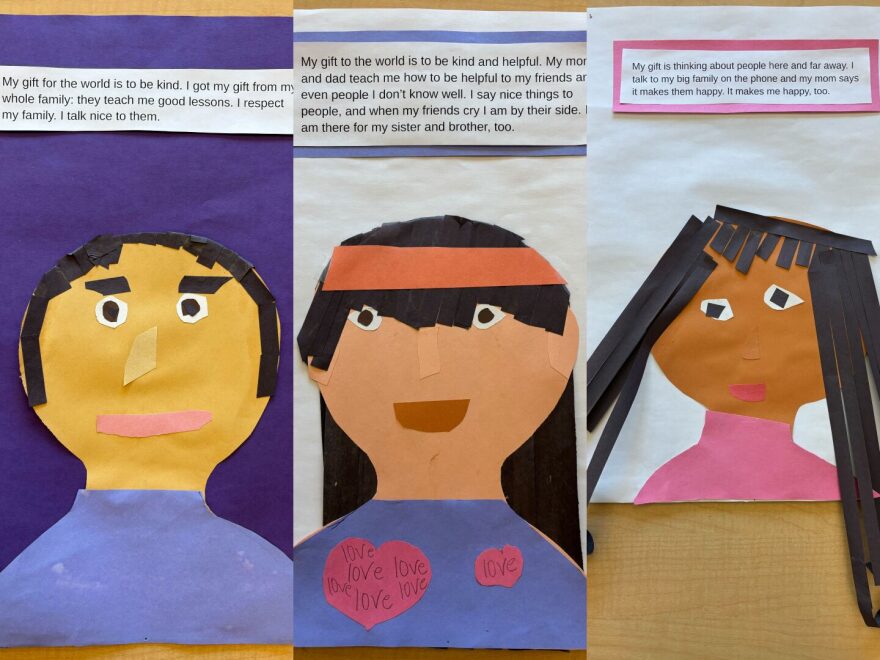Some immigrants living in Juneau left the United States recently after an email from the U.S. Department of Homeland Security told them they had to leave.
But one family who received the email hasn’t left.
A woman, her husband and teenage daughter fled Venezuela in May 2023 and eventually resettled in Juneau with temporary parole status. She spoke to KTOO on the condition of anonymity because of her unstable immigration status.
Last month, along with thousands of other people across the country, the family got an email from the Trump Administration saying it was time for them to leave the United States. It said they would be subject to prosecution if they stay.
After receiving the email, she’s afraid they will all get deported.
“Really they don’t feel safe at all,” said Gwenna Corvez. She’s a local English language teacher who translated the woman’s answers to KTOO’s questions.
“Their lawyer is telling them to be calm, that there’s a process for all of this. But they see on the news that the government now doesn’t respect the process and that they could be arrested and deported, and that there’s no guarantee that they’ll get to stay,” she translated.
The woman said they can’t go back to Venezuela. Her family was targeted by the government there because her husband was a member of a union at a metal plant that Venezuelan authorities deem a threat.
Her lawyer told her the email is unenforceable. Their parole status was canceled by Trump, but they are in the process of applying for other forms of legal status. As long as they are in that process, they shouldn’t qualify for deportation.
The email was sent to thousands of people who legally entered the U.S. through a mobile app — CPB One. It wasn’t addressed to any specific name, or signed by anyone. Immigration experts say it’s a scare tactic.
The woman says she did everything right to legally come to the United States, and that’s what makes getting this message so frustrating.

The family’s journey from Venezuela to Juneau took a year, and they feared for their lives throughout. They crossed the notoriously dangerous Darien Gap, waited for months in Panama, and walked through most of Mexico. They heard stories of other migrants who were killed on the same journey.
Then, using the CPB One app, they spent five months in Mexico City applying for an appointment to seek asylum in the U.S.
They arrived in Juneau last May. Since then, the woman has worked in housekeeping and her husband in construction. She said through Corvez that the community has been welcoming and supportive.
“It was the best decision that they made,” Corvez translated. “And they knew a group of people who volunteer at St. Vincent de Paul and they treated them like family and took really good care of them and never let them be alone. And she says it’s a very beautiful thing that’s happened here.”
And those volunteers even helped her teenage daughter adapt to high school in Juneau. She’s making friends, and her mother is relieved.
“The first day she was, you know, very scared because she didn’t speak any English but then a volunteer from St. Vincent came and helped and now she speaks English relatively well and has really good grades,” Corvez translated. “Thank God, yes, really good grades now.”
And other families are in limbo, too, according to Corvez. She teaches English to students who belong to immigrant families in Juneau. She also taught the youngest members of another family that got the email – but they decided to leave.
“They were sitting at their desks just a few days ago, and some of them had to leave,” Corvez said. “And so you have empty desks where these wonderful students were.”
And those empty desks leave other children from immigrant families in fear.
“Some of the children who are left behind here are other legal immigrants who now wonder if and when the same thing might happen to them, right?” Corvez said. “Young children are paying closer attention to the news than ever before, and they kind of sense the new uncertainty in their lives.”
Part of that uncertainty stems from the way immigration orders are coming from the administration. Between Trump’s sweeping decisions, and judges blocking those orders, it’s hard to know what comes next.

